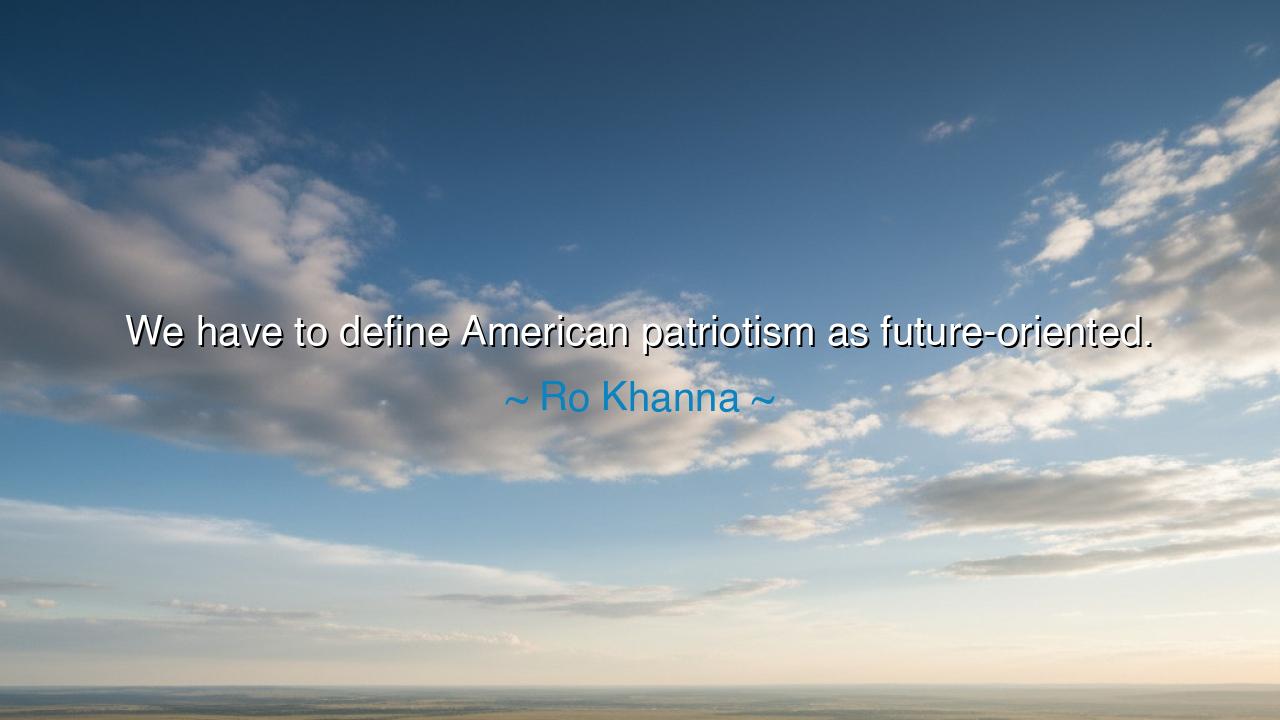
We have to define American patriotism as future-oriented.






The words of Ro Khanna—“We have to define American patriotism as future-oriented.”—resound like a clarion call for renewal. They remind us that love of country cannot remain a shrine to the past alone. It must be a fire that lights the path ahead, a vision that inspires generations yet unborn. In this declaration, patriotism is no longer a relic, frozen in monuments and memories, but a living force that pushes the nation forward toward justice, progress, and greatness yet to come.
Khanna’s words arise from the long tradition of American self-examination. From the birth of the Republic, voices have proclaimed that America’s promise lies not only in what has been achieved, but in what is still to be realized. The Founding Fathers spoke of liberty and equality, yet they left much undone. Abraham Lincoln, in the crucible of civil war, urged Americans to take up the “unfinished work” of freedom. Martin Luther King Jr. declared that the nation must live out the “true meaning of its creed.” Each of these voices echoed the same truth Khanna now proclaims: patriotism is future-oriented, a loyalty not only to what is, but to what must be.
Consider the story of the Apollo program. When John F. Kennedy called upon Americans to reach the moon, it was not because it was easy, but because it was hard. This was patriotism of the future—a vision that demanded sacrifice, imagination, and unity to accomplish something beyond the present horizon. The moon landing was not merely a triumph of science; it was a triumph of faith in the nation’s potential. It proved that love of country is not only shown by honoring past victories, but by daring to pursue new ones.
Khanna’s call also warns against a dangerous temptation: the temptation to define patriotism only by nostalgia. When love of country becomes bound only to the glories of yesterday, it risks blindness to the injustices of today and the opportunities of tomorrow. A nation that gazes only backward stagnates, and patriotism becomes a chain instead of a torch. But when patriotism looks forward—toward innovation, toward equality, toward sustainability—it breathes life into the republic and makes it ever young.
The ancients knew this wisdom well. They spoke of a good leader not only as a guardian of tradition, but as a builder of the future. Rome endured not because it clung only to the past, but because it continually built roads, aqueducts, and laws for the generations ahead. Likewise, America’s strength lies not merely in remembering its founders, but in extending their ideals into realms they never imagined—digital frontiers, ecological stewardship, and global responsibility.
The lesson for us is clear: to be truly patriotic is not only to salute the flag, but to ask, “What will this flag mean tomorrow?” It is to ensure that the next generation inherits a land freer, fairer, and more prosperous than our own. It is to carry forward the unfinished work of justice, to expand the circle of opportunity, and to leave behind a legacy worthy of remembrance.
In daily life, this means practicing a future-oriented patriotism by investing in education, supporting innovation, protecting the planet, and striving for unity over division. It means seeing our civic duties not as burdens, but as seeds we plant for those who will come after us. Each act of service, each vote cast, each injustice challenged is a stone laid on the road to the America of tomorrow.
Thus let Khanna’s words be etched upon our hearts: patriotism must be future-oriented. Let us honor the past, but not be imprisoned by it. Let us cherish tradition, but not worship it. Let us prove our love for America not only by remembering what it was, but by striving to make it what it can yet become—a nation forever unfinished, forever striving, forever renewed.






AAdministratorAdministrator
Welcome, honored guests. Please leave a comment, we will respond soon